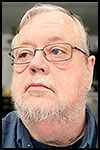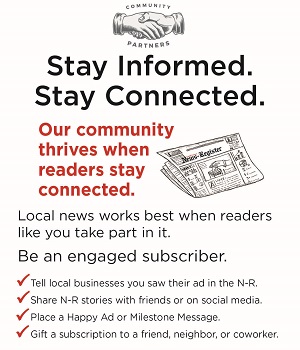Hughes: A vanishing voice
Dear reader, you are fortunate.
You can read editorials in the News-Register that make you smile.
You can read editorials in the News-Register that make you scowl.
You can read editorials in the News-Register that challenge your thinking — and others that validate your views.
Regardless of whether you agree, disagree or are uncertain, you are presented with thoughtful, nuanced viewpoints that you can discuss with your neighbors and civic leaders. And that opportunity has disappeared in too many communities.
Editorials are the institutional voice of a newspaper, reflecting the composite view of the editorial page staff, not the staff as a whole. They respect the wall between reporting news and writing opinion.
Editorials are a cornerstone of any democracy. They hold the powerful accountable, promote civic engagement and stand up for people whose voices are ignored. In short, editorials both lead and listen.
Yet more and more newspapers in Oregon, and around the country, have abdicated that role — whether to save newsprint costs, reduce staffing costs, avoid writing anything that might alienate potential readers, or all of the above.
In a 2013 essay for the Pew Research Center, Jodi Enda wrote of that accelerating trend, saying, “Some have shifted away from one of the historic missions of newspapers — influencing public opinion — and instead seek to foment community conversations online.”
The irony is that research suggests lively, locally focused editorials increase readership and provides an antidote to the national partisanship of, “I’m right, therefore you’re wrong.”
Two of Oregon’s journalistic mainstays — the Salem Statesman Journal, where I served as longtime editorial page editor, and the Eugene Register-Guard, where I also contributed pieces — have dropped local editorials in recent years. So have various smaller publications.
Some newspapers have replaced staff-written editorials with pro-cons and essays by local or regional experts.
There’s certainly no problem with such pieces. Newspapers should have been providing space for them all along — in addition to editorials, letters to the editor and other forms of opinion. As editorial page editor, I wanted each day’s opinion pages to include a broad range of views.
But a newspaper without local editorials is a newspaper without a soul. Editorials are a community talking with itself, a community engaged in thoughtful self-examination.
A well-researched editorial doesn’t tell people what to think, but it does give readers much to chew on. A well-thought-out editorial stakes out a clear, strong position instead of simply parroting popular viewpoints. A well-argued editorial might inspire some and irritate others, it might comfort or challenge, but it always provides nutritious food for thought.
The light shone by editorials can illuminate the good and not-so-good functioning of a democratic society.
Without editorials, who is holding city councils, school boards and county officials accountable — congratulating them when appropriate while being unafraid to criticize? Who is watching to ensure the public’s business actually is conducted in public? And as elections approach, who is neutrally evaluating political candidates and recommending which ones are most competent, prepared and trustworthy?
A newspaper must have the courage to do that work — to lead.
Years ago, I interviewed for a city editor position at a metropolitan newspaper in the Southwest. One of its top executives proudly told me the newspaper’s opinion pages were so in line with the community that 95% of the time, candidates endorsed by the editorial board won election.
It was immediately clear that I couldn’t stomach working there. Waddling in conventional wisdom does not equate to civic leadership.
By giving an opinion, editorials go where news stories should not. But local news coverage, which provides the gist for editorial ideas, also has suffered when newspapers cut back.
“A growing body of research has found that government is worse off when local news suffers,” Joshua P. Barr, assistant professor of political communication at Louisiana State University, wrote last month on FiveThirtyEight. He explained:
“In fact, inadequate local news has been linked to more corruption, less competitive elections, weaker municipal finances and a prevalence of party-line politicians who don’t bring benefits back to their districts. Local political news offers Americans what political scientist Lilliana Mason calls a ‘cross-cutting identity’ — something that connects partisans on a different dimension instead of further dividing them along party lines.
“Put another way, when people read news about their neighborhoods, schools and municipal services, they think like locals. When they read about national political conflict, they think like partisans.”
And that extends to the opinion pages.
Barr and fellow researchers Matthew P. Hitt and Johanna L. Dunaway analyzed what happened in 2019 when The Desert Sun in Palm Springs, California, decided to drop national political issues from its opinion page for a month. They wrote a book about their research, which found, “Local newspapers can hold back the rising tide of political division in America by turning away from the partisan battles in Washington and focusing their opinion page on local issues.”
By the way, The Desert Sun continues producing local editorials.
I’m proud of the News-Register, where I began my professional journalistic career as a reporter in 1976, for holding to its age-old civic responsibility. Newspapers are the original town square — speaking forcefully through editorials, but always giving readers the last word through letters to the editor.













Comments